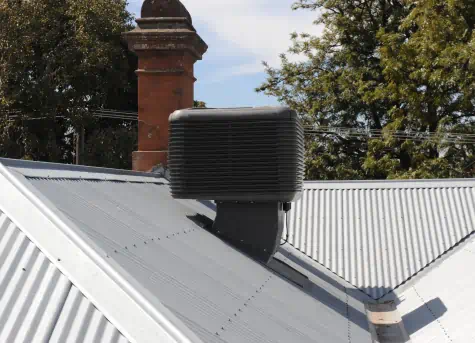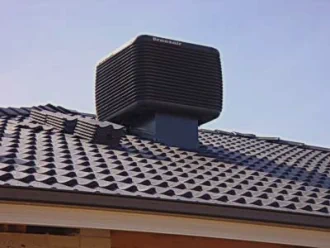
Evaporative Cooling vs Air Conditioning: Which Is Best for Your Home?
Welcome to Coldflow Heating and Cooling. As the temperatures begin to rise, choosing the right cooling solution for your home becomes essential. At Coldflow, we’re committed to providing Melbourne homeowners with the knowledge and expertise needed to make informed decisions about their indoor comfort. In this article, we break down the key differences between evaporative cooling and traditional air conditioning, exploring their benefits, cost considerations, and climate suitability. Whether you’re focused on energy efficiency, budget-friendly options, or optimal performance in your local climate, our goal is to help you find the perfect solution to keep your home cool and comfortable all year round.
Understanding the Basics
Evaporative Cooling operates on a simple principle: it uses water to cool the air. Warm air passes through water-saturated pads, causing the water to evaporate and thereby reducing the air temperature before it circulates through your home. This process is energy-efficient and environmentally friendly, making it an attractive option for many homeowners.
Air Conditioning (AC) systems, on the other hand, use a refrigeration cycle to cool the air. They remove heat and humidity from the indoor environment, providing consistent and controllable cooling regardless of external conditions. Modern AC units come with advanced features like programmable thermostats, air purifiers, and variable-speed fans.
Energy Efficiency
When it comes to energy efficiency, evaporative cooling generally has the upper hand. These systems consume significantly less electricity compared to traditional air conditioners because they rely on the natural process of evaporation rather than mechanical refrigeration. For homeowners looking to reduce their energy bills and carbon footprint, evaporative coolers present a compelling option.
Air conditioning systems, while more energy-intensive, have become more efficient over the years. High-efficiency models can offer substantial energy savings compared to older units. However, in regions with high humidity, AC systems may need to work harder to maintain comfortable indoor conditions, potentially offsetting some of these savings.
Cost Considerations
Initial Installation and Maintenance Costs:Evaporative coolers typically have lower upfront costs. They are simpler in design, making installation quicker and less expensive. Maintenance is also straightforward, involving regular cleaning of the pads and ensuring a steady water supply.
Air conditioning systems usually require a higher initial investment, especially for central units that cool an entire home. Installation can be more complex, often necessitating professional expertise. Maintenance costs are higher as well, with regular servicing needed to keep the refrigerant levels optimal and components functioning efficiently.
Operating Costs: While evaporative coolers are cheaper to run, especially in dry climates, air conditioners may incur higher operating costs due to their greater energy consumption. However, in areas with moderate climates, the difference in operating costs might be less pronounced, particularly with energy-efficient AC models.
Performance and Comfort
Evaporative Cooling: Evaporative coolers work best in hot, dry climates where humidity levels are low. In such environments, they can effectively reduce indoor temperatures while adding a pleasant level of humidity. However, in humid regions, their efficiency drops, and they may not provide the desired cooling effect.
Air Conditioning: AC systems excel in a wide range of climates, especially in areas with high humidity. They offer precise temperature control and can maintain a consistent indoor environment regardless of external weather conditions. Additionally, air conditioners can improve indoor air quality by filtering out pollutants and allergens, providing a healthier living space.
Climate Suitability
Choosing between evaporative cooling and air conditioning largely depends on your local climate:
- Dry Climates: Evaporative coolers are ideal for regions with low humidity. They provide effective cooling while being cost-efficient and environmentally friendly.
- Humid Climates: Air conditioners are better suited for areas with high moisture levels. They effectively remove humidity from the air, ensuring a comfortable indoor environment.
Making the Right Choice for Your Home
When deciding between evaporative cooling and air conditioning, consider the following factors:
- Local Climate: Assess the humidity levels and average temperatures in your area.
- Energy Efficiency Goals: Determine your priorities regarding energy consumption and environmental impact.
- Budget: Evaluate both the initial installation costs and long-term operating expenses.
- Comfort Preferences: Decide whether you prefer a consistent and controlled cooling environment or are comfortable with the natural humidity provided by evaporative cooling.
Expert Installation and Service in Melbourne
If you’re in Melbourne and leaning towards evaporative cooling, Coldflow Heating and Cooling is your go-to expert. With years of experience in handling evaporative cooler installations and providing top-notch service, Coldflow ensures your cooling system operates efficiently and effectively. Their team of professionals can help you choose the right system for your home, handle the installation process seamlessly, and offer ongoing maintenance to keep your air con running smoothly.
Conclusion
Both evaporative cooling and air conditioning have their merits, and the best choice depends on your specific needs and circumstances. Evaporative coolers offer an energy-efficient and cost-effective solution for dry climates, while air conditioners provide reliable and versatile cooling suitable for a wider range of environments. By carefully considering your climate, budget, and comfort preferences, you can select the cooling system that best enhances the comfort and efficiency of your home.
View Air Conditioning Articles







 Dealer Only Brands: Daikin, Breezair, etc.
Dealer Only Brands: Daikin, Breezair, etc.
